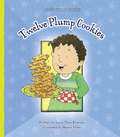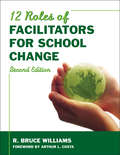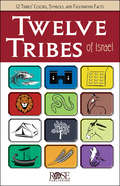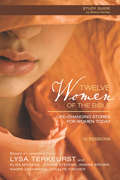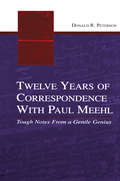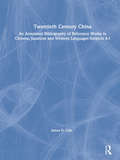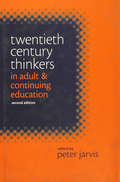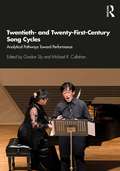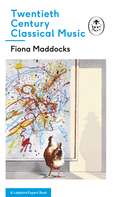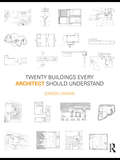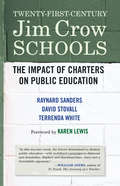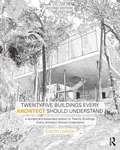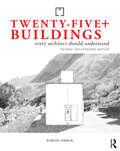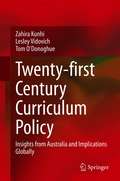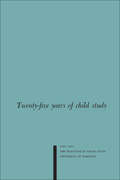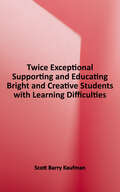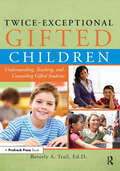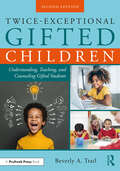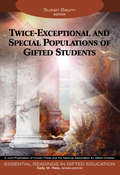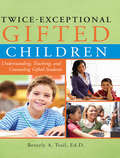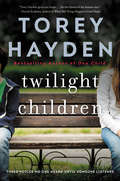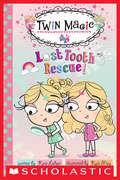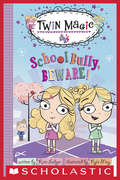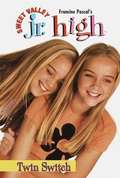- Table View
- List View
Twelve Plump Cookies
by Larry Dane BrimnerEgbert practices division as he shares cookies with his friends and neighbors.
Twelve Roles of Facilitators for School Change
by R. Bruce WilliamsPacked with practical tools, this valuable resource outlines 12 specific roles for educators who want to facilitate effective change in their schools through collaboration and shared leadership.
Twelve Tribes of Israel
by Rose PublishingEnjoy having a simple overview on the 12 Tribes of Israel at your fingertips. See each tribe's symbol, meaning, history, and other fascinating facts at a glance. Includes incredible visual aids, such as a full-color map, family tree, Tabernacle diagram, and more. Almost every person in the Bible belonged to one of the 12 Tribes of Israel based on their ancestry: From Moses who was a Levite to the Apostle Paul who was Benjaminite. Each tribe had its own history, land, and heritage. Now you can easily grasp the "backstory" of each tribe and see key information at a glance! For example, find out the significance of Jesus being called the "Lion of Judah." For each of the 12 Tribes of Israel, you will get--* A quick overview of its meaning, size, family history, location, and more.* A picture of the tribe's symbol (such as the lion from the Tribe of Judah)* Simple summary of Jacob's blessing, Moses' blessing, and other key events related to each tribe. (Find out the major battles, controversies, and scandals that impacted each tribe. Plus, see which important Bible people came from each tribe of Israel.) Features Incredible Visual Aids (Map of Israel, Tabernacle Diagram, and more) This pamphlet is packed with visual aids that will help you see key information at a glance. These visuals will enrich your understanding of the 12 Tribes of Israel and add depth to any Old Testament study:* Family Tree of Jacob (Israel)* Tabernacle diagram showing where each of the 12 tribes encamped around the Tabernacle. * Time Line showing key events, starting with Abraham's journey from Haran* Easy-to-read, full-color map showing how the "promised land" was divided amongst each of the 12 tribes according to their inheritance. The map is color-coded so you can easily spot each tribe's location!
Twelve Women of the Bible Study Guide: Life-Changing Stories for Women Today
by Elisa Morgan Lysa Terkeurst Jeanne Stevens Naomi Zacharias Amena Brown Jonalyn Grace FincherIn the Twelve Women of the Bible Study Guide, a companion to the twelve-session video Bible study, individuals and small groups will learn about the triumphs and failures of Mary Magdalene, Rebekah, Hannah, and nine other women, studying their lives and learning how to: Apply biblical lessons to their own modern-day struggles Live through their failures as well as successes Draw near to God in a world filled with trials Find lasting contentment Overcome rejection and insecurity And much more. Designed for use with the video.
Twelve Years of Correspondence With Paul Meehl: Tough Notes From a Gentle Genius
by Donald R. PetersonIn 1996 Division 12 of the APA presented Centennial Awards to two psychologists who were considered to have made the greatest lifetime contributions to the discipline. One of those individuals was Paul Meehl. Dr. Meehl's writings on research methodology and mental illness influenced generations of researchers and psychotherapists.Twelve Years of Correspondence With Paul Meehl is composed mainly of letters between Drs. Paul Meehl and Donald Peterson during the final 12 years of Meehl's life. After Meehl's death, Dr. Peterson revisited their correspondence, and found a remarkable order in it. One topic flowed into another. With some connective, explanatory text, the letters shaped themselves into a book. The correspondence forms a story of the relationship between an extraordinary mentor and his student, as well as a dialogue between two eminent psychologists.The letters explore penetrating questions, and underlying arguments, about some of the most recalcitrant issues that scientists and practitioners encounter in their efforts to understand the human condition. Paul Meehl contributed notably to seven areas: philosophy of science, learning, schizophrenia, clinical and research training, personality assessment, taxometrics, and clinical versus statistical prediction. The letters touch on each of these areas and examine some issues more thoroughly than either Meehl or Peterson had done in any other writings. The book includes an extensive set of endnotes that identify the many works that are referred to in the letters as well as explanatory comments. This intimate look at Paul Meehl's way of thinking will appeal to graduate students and professionals in such diverse fields as psychology, psychiatry, biology, sociology, law, education, and philosophy.
Twentieth Century China: An Annotated Bibliography of Reference Works in Chinese, Japanese and Western Languages
by James H. ColeThis bibliography of reference works from Chinese, Japanese and Western language sources covers: the 1911 Revolution; the Republic of China (1912-1949); the People's Republic of China (1949 onwards); post-1911 Hong Kong and Macau; and post-1911 overseas Chinese. Filled with helpful checklists, charts, and suggestions for further reading, this practical, comprehensive, and multidisciplinary guide takes readers through the entire case-writing process, including skills for writing both teaching cases and research cases. This edition includes new discussions of students as case writers, and how to interpret and respond to reviews, as well as updated and expanded material on video, multimedia and Internet cases.
Twentieth Century Thinkers in Adult and Continuing Education (International Perspectives On Adult And Continuing Education Ser.)
by Peter JarvisAn examination of the work of 17 major thinkers in the field of adult and continuing education, showing how each has made a significant contribution to the field. The ideas of each are explored within a similar framework, and their work and its consequences is considered in detail.
Twentieth- and Twenty-First-Century Song Cycles: Analytical Pathways Toward Performance
by Gordon Sly Michael R. CallahanTwentieth- and Twenty-First-Century Song Cycles: Analytical Pathways Toward Performance presents analyses of fourteen song cycles composed after the turn of the twentieth century, with a focus on offering ways into the musical and poetic structure of each cycle to performers, scholars, and students alike. Ranging from familiar works of twentieth-century music by composers such as Schoenberg, Britten, Poulenc, and Shostakovich to lesser-known works by Van Wyk, Sviridov, Wheeler, and Sánchez, this collection of essays captures the diversity of the song cycle repertoire in contemporary classical music. The contributors bring their own analytical perspectives and methods, considering musical structures, the composers' selection of texts, how poetic narratives are expressed, and historical context. Informed by music history, music theory, and performance, Twentieth- and Twenty-First-Century Song Cycles offers an essential guide into the contemporary art-music song cycle for performers, scholars, students, and anyone seeking to understand this unique genre.
Twentieth-Century Classical Music: A Ladybird Expert Book (The Ladybird Expert Series #20)
by Fiona MaddocksPart of the ALL-NEW LADYBIRD EXPERT SERIES.____________How did modern classical music develop over the 20th Century?What enabled women to get their music performed in the early 1900s?Which classical composers borrowed from jazz?How did composers respond to politics and war?DISCOVER the stories behind Mahler's, Symphony No. 5 (1901-2), Ullman's Piano Sonata No. 7 (1944), Bernstein's West Side Story (1957), as well as learn about minimalism, jazz, swing, opera . . . AND UNDERSTAND TWENTIETH CENTURY CLASSICAL MUSIC.Discover the answers and more inside Fiona Maddocks' Twentieth Century Classical Music, the thrilling and accessible account that explains what happened throughout the 20th century, who the key composers were and what influenced them to write what they did?
Twenty Buildings Every Architect Should Understand: A Revised And Expanded Edition Of Twenty Buildings Every Architect Should Understand
by Simon UnwinHave you ever wondered how the ideas behind the world's greatest architectural designs came about? What process does an architect go through to design buildings which become world-renowned for their excellence? This book reveals the secrets behind these buildings. He asks you to 'read' the building and understand its starting point by analyzing its final form. Through the gradual revelations made by an understanding of the thinking behind the form, you learn a unique methodology which can be used every time you look at any building.
Twenty-First-Century Jim Crow Schools: The Impact of Charters on Public Education
by Karen Lewis David Stovall Raynard Sanders Terrenda White Thomas PedroniHow charter schools have taken hold in three cities—and why parents, teachers, and community members are fighting backCharter schools once promised a path towards educational equity, but as the authors of this powerful volume show, market-driven education reforms have instead boldly reestablished a tiered public school system that segregates students by race and class. Examining the rise of charters in New Orleans, Chicago, and New York, authors Raynard Sanders, David Stovall, and Terrenda White show how charters—private institutions, usually set in poor or working-class African American and Latinx communities—promote competition instead of collaboration and are driven chiefly by financial interests. Sanders, Stovall, and White also reveal how corporate charters position themselves as “public” to secure tax money but exploit their private status to hide data about enrollment and salaries, using misleading information to promote false narratives of student success.In addition to showing how charter school expansion can deprive students of a quality education, the authors document several other lasting consequences of charter school expansion: • the displacement of experienced African American teachers • the rise of a rigid, militarized pedagogy such as SLANT • the purposeful starvation of district schools • and the loss of community control and oversight A revealing and illuminating look at one of the greatest threats to public education, Twenty-First-Century Jim Crow Schools explores how charter schools have shaped the educational landscape and why parents, teachers, and community members are fighting back.
Twenty-Five Buildings Every Architect Should Understand: a revised and expanded edition of Twenty Buildings Every Architect Should Understand
by Simon UnwinTwenty-Five Buildings Every Architect Should Understand is an essential companion to Simon Unwin's Analysing Architecture, and part of the trilogy which also includes his Exercises in Architecture: Learning to Think as an Architect. Together the three books offer an introduction to the workings of architecture providing for the three aspects of learning: theory, examples and practice. Twenty-Five Buildings focusses on analysing examples using the methodology offered by Analysing Architecture, which operates primarily through the medium of drawing. In this second edition five further buildings have been added to the original twenty from an even wider geographical area, which now includes the USA, France, Italy, Mexico, Switzerland, Spain, Finland, Germany, Australia, Norway, Sweden, India and Japan. The underlying theme of Twenty-Five Buildings Every Architect Should Understand is the relationship of architecture to the human being, how it frames our lives and orchestrates our experiences; how it can help us make sense of the world and contribute to our senses of identity and place. Exploring these dimensions through a wide range of case studies that illustrate the rich diversity of twentieth and twenty-first century architecture, this book is essential reading for every architect.
Twenty-Five+ Buildings Every Architect Should Understand: Revised and Extended Edition
by Simon UnwinThe underlying theme of Twenty-Five+ Buildings Every Architect Should Understand is the relationship of architecture to the human being, how it frames our lives and orchestrates our experience; how it can help us make sense of the world and contribute to our sense of identity and place. Exploring these dimensions through a wide range of case studies that illustrate the rich diversity of twentieth- and twenty-first-century architecture, this book is essential reading for every architect. With the addition of numerous shorter analyses, this new edition covers an even greater range of architectural ideas, providing students and architects with further inspiration for exploration in their own design work. Architects live by ideas. But where do they come from? And how do they shape buildings? There is no one right way to do architecture. This book illustrates many. Its aim is to explore the rich diversity of architectural creativity by analysing a wide range of examples to extract the ideas behind them. Twenty-Five+ Buildings Every Architect Should Understand is a companion to Simon Unwin’s Analysing Architecture: the Universal Language of Place- Making (most recent edition, 2021), and part of the trilogy which also includes his Exercises in Architecture: Learning to Think as an Architect (second edition, 2022). Together the three books offer an introduction to the workings of architecture providing for the three aspects of learning: theory, examples and practice. Twenty-Five+ Buildings focusses on analysing examples using the methodology offered by Analysing Architecture, which operates primarily through the medium of drawing. An underlying theme of Twenty-Five+ Buildings Every Architect Should Understand is the relationship of architecture to the human being, how it frames our lives and orchestrates our experiences; how it can help us give form to the world and contributes to our senses of identity and place. Exploring these dimensions through case studies that illustrate the rich diversity of twentieth- and twenty-first-century architecture, this book is essential reading, and hopefully an inspiration, for every architect. In this new edition supplementary analysis and discussion has been added to each of the twenty-five case studies, drawing attention to their influences from and on other architects. A number of extra shorter analyses have been included too, following the practice of presenting extra small dishes interspersed among main courses in high-end restaurants. These additional short analyses account for the + sign after ‘Twenty-Five’ in the title of this edition, and double the number of buildings analysed to around fifty.
Twenty-first Century Curriculum Policy: Insights from Australia and Implications Globally
by Lesley Vidovich Tom O'Donoghue Zahira KunhiThis book focuses on the phenomenon of a ‘21st century curriculum’ and its role in preparing students for work and life in a rapidly changing global knowledge society. Its context is the global and diverse national influences on education policy agendas. The central concepts in the academic literature that underpins the phenomenon are globalisation, curriculum, and policy. The analysis spans global influences on the development of ‘21st century curriculum’ policy, the construction of such policy at the national and State levels in Australia, and the enactment of such policy in three select case-study schools and in relation to which both similarities and differences are identified. The global to local span and the international relevance of the exposition are both revisited to highlight major findings, to discuss them in relation to recent literature and to offer propositions about ‘21st century curriculum’ development that are of wide interest and relevance. Recommendations for policy and practice as well as possible future directions for research in the field follow.
Twenty-five Years of Child Study: The Development of the Programme and Review of the Research at the Institute of Child Study, University of Toronto 1926-1951
by Margaret Fletcher Karl Bernhardt Frances Johnson Dorothy Millichamp Mary Northway Institute of Child StudyThis is the story of the Institute of Child Study, University of Toronto, from its beginning in 1926 to the present. To honour the Director, W.E. Blatz, it has been written by members of the staff and its publication financed by parents of children who have attended the Nursery School and by students, graduates, and friends of the Institute. The book is centred around the research programme which the Institute has conducted during the quarter century. It contains abstracts of all its scientific papers and publications and reviews these to indicate the significant trends. The stories of the Institute's foundation, of its programmes of parent education and nursery school procedures, form a setting from which the research has emerged and to which its discoveries have contributed. Thus research is described as no abstract pursuit but as an activity arising out of social need and reflecting its achievements to the social good. The book will of course be of interest to everyone to who knows the Institute or its Director. It will be of value, we believe, also to all teachers and students in child study centres; they will find it a handbook of research papers in this field. To those in the social sciences it will serve as an illustration of the growth and organization of an Institution peculiar to the twentieth century and specific in its formulated purposes. Although the book has been created to pay tribute to the Director and to mark the event of the Institute's twenty-fifth year, it is in no way an eulogy extolling past achievements. Rather, as the Preface states, "we have attempted to be as honest, in this volume, as we have insisted we should be in our scientific researches. We have tried, indeed to tell the truth. 'Truth is such a rare thing, it is delightful to tell it.' We have expected the authors of each chapter to give an accurate picture of the topic as they evaluate it; we believe it is through the unique slants of the individual writers we attain a true vision of the whole. Nothing is here but that which we believe; the significance of the project has been 'in the fulfilling rather than the fulfillment.' "The activities of the past provide us with hope for the future. This attempt to solidify our previous efforts has led us to re-affirm our belief that to increase human understanding is the most satisfying of all possible enterprises."
Twice Exceptional: Supporting and Educating Bright and Creative Students With Learning Difficulties
by Scott Barry KaufmanIn an educational system founded on rigid standards and categories, students who demonstrate a very specific manifestation of intelligence flourish, while those who deviate tend to fall between the cracks. Too often, talents and interests that do not align with classroom conventions are left unrecognized and unexplored in children with extraordinary potential but little opportunity. For twice-exceptional (2e) children, who have extraordinary strengths coupled with learning difficulties, the problem is compounded by the paradoxical nature of their intellect and an unbending system, ill-equipped to cater to their unique learning needs. <p><p>Twice Exceptional: Supporting and Educating Bright and Creative Students with Learning Difficulties provides cutting-edge, evidence-based approaches to creating an environment where twice-exceptional students can thrive. Viewing the 2e student as neither exclusively disabled nor exclusively gifted, but, rather, as a dynamic interaction of both, leading experts offer holistic insight into identification, social-emotional development, advocacy, and support for 2e students. With chapters focusing on special populations (including autism, dyslexia, and ADHD) as well as the intersection of race and 2e, this book highlights practical recommendations for school and social contexts. In expounding on the unique challenges faced by the 2e population, Twice Exceptional makes a case for greater flexibility in our approach to education and a wider notion of what it means to be academically successful.
Twice-Exceptional Gifted Children: Understanding, Teaching, and Counseling Gifted Students
by Beverly A. TrailGifted students with disabilities, also referred to as twice-exceptional children, need the strategies in Twice-Exceptional Gifted Children: Understanding, Teaching, and Counseling Gifted Students in order to find success in the regular classroom. By offering a thorough discussion of twice-exceptional students based on research into how gifted students with disabilities learn, the author helps teachers and education professionals develop a broad understanding of the complex issues associated with gifted students who have disabilities.This comprehensive text provides an overview of who these students are, how teachers can tap into their strengths and weaknesses, and what educational strategies should be implemented to help these students succeed in school and beyond. The book will guide a collaborative team step-by-step through the process of identifying students' needs, selecting modifications and accommodations, and developing a comprehensive plan to meet the diverse needs of twice-exceptional children. By implementing the strategies suggested in this book, teachers of twice-exceptional gifted students can ensure these students do not just survive in the classroom, but thrive.
Twice-Exceptional Gifted Children: Understanding, Teaching, and Counseling Gifted Students
by Beverly A. TrailTwice-Exceptional Gifted Children, Second Edition provides informed recommendations for improving screening, identification, and services for gifted students with disabilities. This essential resource equips educators with an overview of who these students are, how teachers can tap into their strengths and support their weaknesses, and educational strategies to help them succeed in school and beyond. Thoroughly revised and updated to reflect the latest research and advances in the field, the Second Edition includes new content outlining the positive and negative impacts of Response to Intervention (RtI) on twice-exceptional learners and recommends comprehensive assessments to identify their strengths and challenges, determine significant discrepancies in abilities, and evaluate any impacts on their learning and academic performance. This new edition also includes revised recommendations for screening and identifying twice-exceptional students, critical insights for understanding and supporting mental health issues, and updated analysis from the DSM-5 for Autism Spectrum Disorder, Specific Learning Disorder, and ADHD. Ideal for teachers, coaches, and administrators looking to better understand their most talented learners, the fresh strategies, updated definitions, and comprehensive assessments included in this book will ensure that twice-exceptional gifted students don’t just survive in the classroom, but thrive.
Twice-Exceptional and Special Populations of Gifted Students
by Sally M. Reis Dr Susan Marcia BaumGifted students who are at risk because of learning disabilities, gender issues, or economic disadvantages are highlighted in this volume.
Twice-exceptional Gifted Children: Understanding, Teaching, and Counseling Gifted Students
by Beverly A. TrailGifted students with disabilities, also referred to as twice-exceptional children, need the strategies in "Twice-Exceptional Gifted Children: Understanding, Teaching, and Counseling Gifted Students" in order to find success in the regular classroom. By offering a thorough discussion of twice-exceptional students based on research into how gifted students with disabilities learn, the author helps teachers and education professionals develop a broad understanding of the complex issues associated with gifted students who have disabilities. This comprehensive text provides an overview of who these students are, how teachers can tap into their strengths and weaknesses, and what educational strategies should be implemented to help these students succeed in school and beyond. The book will guide a collaborative team step-by-step through the process of identifying students' needs, selecting modifications and accommodations, and developing a comprehensive plan to meet the diverse needs of twice-exceptional children. By implementing the strategies suggested in this book, teachers of twice-exceptional gifted students can ensure these students do not just survive in the classroom, but thrive.
Twilight Children
by Torey HaydenFrom the author of the phenomenal Sunday Times bestsellers 'One Child' and 'Ghost Girl', comes a startling and poignant memoir of three people's victimisation and abuse - and their heartbreaking but ultimately successful steps to recovery, with the help of Torey Hayden, an extraordinary teacher. Two children trapped in a prison of silence and a woman suffering in the twilight of her years - these are the cases that would test the extraordinary courage, compassion and skill of Torey Hayden and ultimately reaffirm her faith in the indomitable strength of the human spirit. While working in the children's psychiatric ward of a large hospital, Torey was introduced to seven-year-old Cassandra, a child who had been kidnapped by her father and was found dirty, starving and picking though rubbish bins to survive. She refused to speak, so Torey could only imagine what she'd been through. Drake, by contrast, was a charismatic four-year-old who managed to participate fully in his pre-school class without uttering a single word. Then, there was Gerda, eighty-two, who had suffered a massive stroke and was unwilling to engage in conversation with anyone. Although Torey had never worked with adults, she agreed to help when all other efforts had failed.
Twilight Children: Three Voices No One Heard Until a Therapist Listened
by Torey HaydenFrom the bestselling author of One Child comes the story of three of former special education teacher Torey Hayden’s most extraordinary challenges.Nine-year-old Cassandra, kidnapped by her father and found starving, dirty, and picking through garbage cans—is a child prone to long silences and erratic, violent behavior.Charming, charismatic four-year-old Drake will speak only in private to his mother—while his tough, unbending grandfather's demands for an immediate cure threatens to cause irreparable harm.And though she had never worked with adults, Hayden agrees to help fearful and silent eighty-two-year-old massive stroke victim Gerda—discovering in the process that a treatment's successes could prove nearly as heartbreaking as its limitations.
Twin Magic: Lost Tooth Rescue! (Scholastic Reader, Level 2)
by Kate LedgerGirls are sure to love this sparkly new reader series from Kate Ledger!*GLITTER ON THE COVER!*Lottie and Mia are twins with special magic powers--together, they can move objects with their minds! In the first book in this easy-to-read series, Lottie and Mia help a classmate recover her lost tooth. These Super Twins follow a trail of glitter and use their powers to save the day!
Twin Magic: School Bully, Beware! (Scholastic Reader, Level 2)
by Kate LedgerCheck out the second book in Kate Ledger's sparkly new reader series!Lottie and Mia are twins with very special magic powers. In the second book in the series, these Super Twins put their heads together to recover a ball that was thrown up into a tree during recess. It was thrown there by the new kid--who seems like one BIG bully! In the end, Lottie and Mia (and their friend Toby!) all befriend the school bully. *GLITTER ON THE COVER!*
Twin Switch (Sweet Valley Junior High #10)
by Jamie Suzanne Francine PascalJessica thinks the cool thing about having a twin is that you can always count on her to help you out. Especially when your twin is superperfect, ultrasweet, never-gets-mad Elizabeth. But ... Elizabeth doesn't understand why Jessica can't solve her own problems for once. Really, if she didn't love her sister, she might have to strangle her!
